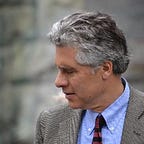“Build, Test, Learn” — What Hegel Knew about Lean Start-ups and Making a Dent in the Universe
George Frederic Hegel was not known for his start-up chops.
A great thinker? To be sure. Extremely handsome? Possibly. But I have no reason to think of him as an entrepreneur. Yet today’s lean start-up mantra, “build-test-learn,” is a direct descendant of the Hegelian Dialectic.
Hegel’s version of the classic “thesis, antithesis, synthesis” is a mode of thinking and progress that moves forward through self-examination and self-critique. The basic progression unfolds as follows: A “Thesis,” representing “things as they are,” within a certain domain, is disrupted by an “Antithesis,” essentially a new idea that vies for acceptance. This struggle for hearts and minds ultimately resolves into a “Synthesis” — a new integrated equilibrium and, ideally, a new Thesis — at least until new disruptions arise.
While it might seem a long journey from Hegel’s 1807 “Phenomenology of the Spirit” to the Foosball tables of Silicon Valley, both are practicing a method of analysis and understanding that stretches all the way back to the dialogues of Plato and probably deep into the history of human progress. A process that Oxford physicist David Deutsch calls “progress through critique.”
The world is far more complex than any of these logical simplifications but the elements of self-awareness and critique are central to human explanations at many levels. We make guesses about how the world works and test them against reality to arrive at new and better understandings. Evolution, for example, tests mutations against the environment for adaptive utility. Science tests hypotheses through empiricism to build deeper explanations. Social systems propose ways of living together that show their flaws only through attempted implementation. And modern technologists dream of useful products but can only know by releasing them into the world.
The thinker Daniel Dennett refers to all such processes as “substrate independent selection algorithms.” That is, no matter the domain (substrate) new ideas are tested against some algorithm (such as adaptation, empiricism, or the marketplace) to demonstrate their utility.
This is all very well and good in the abstract, but in today’s world, where an innovation can embed itself in our daily lives before we have any clear idea about how it affects us, we risk opening ourselves to unknown downsides in exchange for temporary advantage or convenience. Splitting the atom or reassembling the genome can gain market acceptance without sufficient concern for second or third order effects. A malicious meme can circle the globe before, as Mark Twain might have said, the truth “gets its pants on.”
We are living in that world right now, where the downsides of our supposed advances are making themselves known in the form of global warming, social disintegration and the prospect of worsening inequality, just to name a few.
These problems stem from the mechanics of progress itself, whether through “build-test-learn,” the dialectic or any other system. These “selection algorithms” require some goal that is selected for — some measure of what success should look like. Hegel assumed that the dialectic would automatically bring us closer to God, because, well, it was 1807. Today, we cannot make such benign assumptions.
In reality, human notions of progress can and do go horribly wrong. They always have hidden economic or social costs and can even lead us down paths of actual evil or go astray in countless other ways. This was all manageable when the effects were limited to a specific group or geography. But now our interconnections make it impossible to hide from the global-scale impacts we create.
Hegel’s main point was that our desire for learning and progress is unstoppable. It seems to be deeply wired in the human psyche. It may even be the “purpose” for human existence. We exist to make a dent in the universe, as someone smart once said.
But since we can’t stop, we better learn to steer. And that means that our “selection algorithm” needs to be much more thoughtful than temporary convenience or comfort.
By steering and making more thoughtful choices we increase the chances for the human experiment to continue and for Humans to survive to see what happens next.
